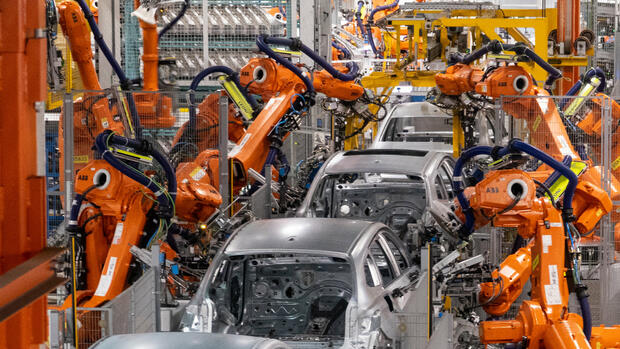Many robots are already used in automobile production, such as here at the BMW main plant. In many industries it is different.
(Photo: dpa)
Munich The demand for robots is increasing significantly in Europe given the shortage of skilled workers and rising energy and personnel costs. The Swiss technology group ABB is now responding to this and is increasing its production capacity in Europe by 50 percent with a $280 million investment in a new robotics campus in Sweden.
“Production in Europe will only be able to survive if companies automate more,” said ABB robotics boss Sami Atiya to Handelsblatt. Due to demographic developments, there will be around 50 million fewer people of working age in Europe by 2035 than in 2010.
The situation is similar in the USA, where 400,000 welders alone are currently being sought. Added to this are the high personnel and energy costs in Europe. “It is essential to increase productivity in Europe.”
In the USA the market is growing even faster than in Europe
According to industry estimates, this is only possible with the increased use of robots. According to the industry association IFR, sales in Europe rose by six percent to 72,000 new installations last year. In the relatively weak Corona year 2020, only 53,000 new robots were sold here.
This means that growth was recently only half as strong as in the USA. However, a lot of new production is currently being built there – because of subsidies under the Inflation Reduction Act and low energy prices. In addition, the density of robots in the USA is still lower than in other regions of the world, so there is still some catching up to do.
But the automation industry is also expecting further growth in Europe. The experts at Interact Analysis expect robot sales in Europe to increase by an average of seven percent annually until 2027.
In addition to the long-standing trend towards automation of production, future technologies are driving demand. The change to electromobility is creating “huge demand” in factories, says ABB robotics boss Atiya. Artificial intelligence helps to make robots easier to program. This makes its use also interesting for small and medium-sized companies.
Hopes have only been partially fulfilled
Most companies also struggled with disrupted supply chains during the coronavirus pandemic and at the start of the Ukraine war. Some of them announced that they would bring some of their production back to Europe. For this so-called reshoring, they need automated production machines at their European locations, which could further drive demand for robotics.
So far, the industry’s hopes have only been partially fulfilled. “A lot of people are talking about reshoring, but I don’t really see it yet,” said Enrico Krog Iversen recently at a meeting of the global robotics association in Munich. As CEO, the Dane once made the cobot world market leader Universal Robots big and now wants to use the D:Ploy platform to attract medium-sized companies in particular to the easy use of robots.
The group is increasing its robot production in Europe by 50 percent.
(Photo: ABB)
Ralf Völlinger from the world market leader Fanuc is convinced that companies in Europe will not be able to escape the automation trend despite many hurdles and reservations: “We will see a lot of automation in industries that have so far only used a few robots,” says ABB manager Atiya Examples include the construction industry and the catering industry.
ABB has just opened a new sample factory in China
Like their customers, robot companies such as ABB, Fanuc and Kuka want to broaden their production in view of the global uncertainties. In recent years, companies have focused primarily on China, which has become the largest robotics market in the world.
At the end of last year, ABB opened a new, fully automated factory near Shanghai. The company wants to triple its production capacity in the country and is investing $150 million in the site.
This is now followed by major investment in the European market. The new campus in Västeras, Sweden, is intended to replace the existing factory. ABB is planning highly automated production, research and development facilities and training centers here. A fleet of autonomous, mobile robots will of course be responsible for transporting materials and products between warehouses, assembly stations and production cells.
ABB is considered the second largest manufacturer of industrial robots behind the world market leader Fanuc. “Of course we want to become the largest robot manufacturer in the world,” says Atiya. He did not want to give a date, but ABB is well on the way.
More: Otto cooperates with the robotics pioneer Boston Dynamics

